新版上海牛津版七年级上册语法
2024秋沪教牛津新七年级上册知识点清单(默写版)
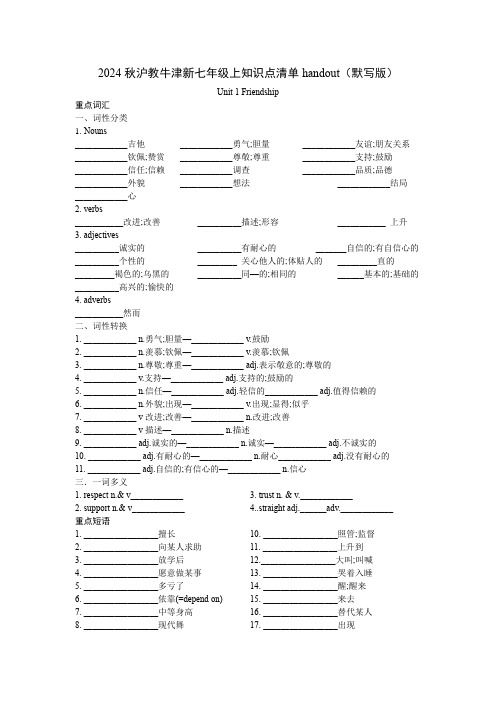
2024秋沪教牛津新七年级上知识点清单handout(默写版)Unit 1 Friendship重点词汇一、词性分类1.Nouns____________吉他____________勇气;胆量____________友谊;朋友关系____________钦佩;赞赏____________尊敬;尊重____________支持;鼓励____________信任;信赖____________调查____________品质;品德____________外貌____________想法____________结局____________心2. verbs___________改进;改善__________描述;形容___________ 上升3. adjectives__________诚实的__________有耐心的_______自信的;有自信心的__________个性的_________ 关心他人的;体贴人的_________直的_________褐色的;乌黑的__________同—的;相同的______基本的;基础的__________高兴的;愉快的4. adverbs___________然而二、词性转换1. ____________ n.勇气;胆量—____________ v.鼓励2. ____________ n.羡慕;钦佩—____________ v.羡慕;钦佩3. ____________ n.尊敬;尊重—____________ adj.表示敬意的;尊敬的4. ____________ v.支持—____________ adj.支持的;鼓励的5. ____________ n.信任—____________ adj.轻信的____________ adj.值得信赖的6. ____________ n.外貌;出现—____________ v.出现;显得;似乎7. ____________ v改进;改善—____________ n.改进;改善8. ____________ v描述—____________ n.描述9. ____________ adj.诚实的—____________ n.诚实—____________ adj.不诚实的10. ____________ adj.有耐心的—____________ n.耐心____________ adj.没有耐心的11. ____________ adj.自信的;有信心的—____________ n.信心三.一词多义1. respect n.& v____________ 3. trust n. & v.____________2. support n.& v____________ 4..straight adj.______adv.____________重点短语1. _________________擅长10. _________________照管;监督2. _________________向某人求助11. _________________上升到3. _________________放学后12._________________大叫;叫喊4. _________________愿意做某事13. _________________哭着入睡5. _________________多亏了14. _________________醒;醒来6. _________________依靠(=depend on)15. _________________来去7. _________________中等身高16. _________________替代某人8. _________________现代舞17. _________________出现9. _________________照顾(= look after / care for)核心句式1.你喜欢做什么?___________________________________________________________ 2.李华乐于助人且有耐心。
上海牛津英语七年级上学期7A U1P2 语法知识点

7A Module 1 RelationshipsUnit 1 Relatives in BeijingP21 soon adv.不久;很快;马上【提示】soon是时间副词。
She will be back soon.她马上就会回来。
2 at the end of (August)在(八月)底【提示】at the end of本意为“在……末端”,用于表示时间、空间中临近结束的意思。
We finally graduated at the end of June.我们终于在六月底毕业了。
(表示时间概念)There is a post office at the end of the street.街道的尽头有一家邮局。
(表示空问概念1【反义】at the beginning of在……的起点1 Can I help you?有什么我可以帮忙的吗?这是商店等服务性行业中营业员常用的一句问话,旨在询问顾客的意见或想法。
也常常说成:What can I do for you?Shop assistant: Madam, what can I do for you/can I help you?营业员:太太,有什么我可以帮忙的吗?Madam: Er.I'd like to buy a pair of jeans for my son.史士:嗯,我想给我儿子买条牛仔裤。
2 Yes, we'd like to travel to Beijing by plane.是的,我们想坐飞机去北京。
would like to do something意为“想要做某事”,相当于want to do something 如:I'd like to have a swim in the sea.我想去海里游泳。
(=I want to have a swim in the sea.)He'd like to have some noodles for lunch.午饭他想吃些面条。
沪教牛津版七上-U1-4知识点、语法(K12教育文档)
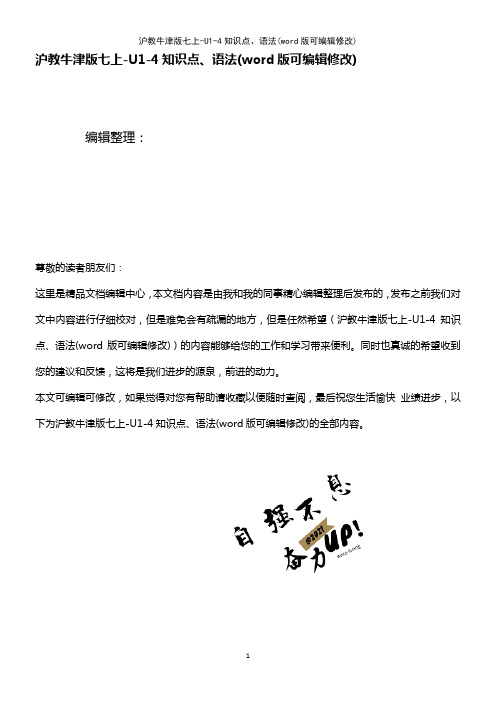
沪教牛津版七上-U1-4知识点、语法(word版可编辑修改)沪教牛津版七上-U1-4知识点、语法(word版可编辑修改)编辑整理:尊敬的读者朋友们:这里是精品文档编辑中心,本文档内容是由我和我的同事精心编辑整理后发布的,发布之前我们对文中内容进行仔细校对,但是难免会有疏漏的地方,但是任然希望(沪教牛津版七上-U1-4知识点、语法(word版可编辑修改))的内容能够给您的工作和学习带来便利。
同时也真诚的希望收到您的建议和反馈,这将是我们进步的源泉,前进的动力。
本文可编辑可修改,如果觉得对您有帮助请收藏以便随时查阅,最后祝您生活愉快业绩进步,以下为沪教牛津版七上-U1-4知识点、语法(word版可编辑修改)的全部内容。
沪教牛津版七上-U1-4知识点、语法(word版可编辑修改)7A UNIT 1 Making friends练习题一、用a ,an,the 或者 \ 填空1.There is ______ water on the floor。
2.There is ___ orange on ____ desk。
3.There is _____ ‘m’ in ‘climb’ and there is ______ ‘u’ in ‘country’.4.二、用括号内动词的适当形式填空。
1. He often ________(have) dinner at home。
2. Nick ____ ___(not go) to the zoo on Sunday.3。
______ they ________(like) pears?4. She is a ________ ( German ) girl.5。
I’d like ________ ( drink ) a cup of tea.三、改错(划出错误的地方,将正确的写在横线上)1。
Is your brother speak English? __________________2。
沪教牛津版英语七年级上册知识点总结

Unit 11来自be from=come from2和...住在一起live with...3靠近.. close to=near4艺术老师an Art teacher5姐姐an elder sister6乘车上学go to school by bus / take a bus to school7 擅长be good at doing sth. = do well in doing sth.8交朋友make friends with...9来自世界各地的朋友people from all over the world =around10 发邮件给某人email sb.11 离...很远far away from....12 .....的意思是the meaning of . (13)在某人的空余时间in one’s free time14 …的答案是the answer to …15 一个德国女孩a German girl16 在互联网上on the Internet17 放风筝fly a kite / fly kites18 收到某人来信hear from sb= receive / get a letter from19 最美好祝愿best wishes20 许多朋友a lot of / lots of / many friends21 洗澡take a bath22 想做某事would like to = want to … 23 你多大了?What’s your age?/ How old are you?24 完成complete=finish4. work as + 职位名称作为…而工作6. walk to school=go to school on foot 走路去上学7. be keen on (doing) sth=be interested in 对….感兴趣8. enjoy (doing) sth= like doing sth 喜欢做某事9. reply to sb回信给某人11. a photo of 一张…的图片13. speak Chinese 说中文15. in the middle 在中间20. write to sb写信给某人,注意pay attention to 以…开始begin with 参考书reference book语法1:特殊疑问词及其引导的特殊疑问句(what, where, when, how, why, which)What refers to things.对事物提问(什么)(可以用来询问职业) Where refers to places.对地点提问(在哪里)Who refers to persons.对人提问(谁)How refers to ways.对年龄提问(多大年纪,几岁)How old refers to ages.对某人或情况提问(怎么样)When refers to times.对时间提问(何时)what time (只能用来问具体几点钟)Why refers to reasons.对原因提问(为什么)which refers to kinds (种类).对事物或人称提问(哪一个,哪一位)How many refers numbers.对数量提问(多少)How old ...多大年纪How often ... 多经常,多久一次How far... 多远How long ... 多长时间How soon 多快,多语法2:不定冠词的用法不定冠词有a和an两个,仅用在单数可数名词前。
新版上海牛津版七年级(上册)语法
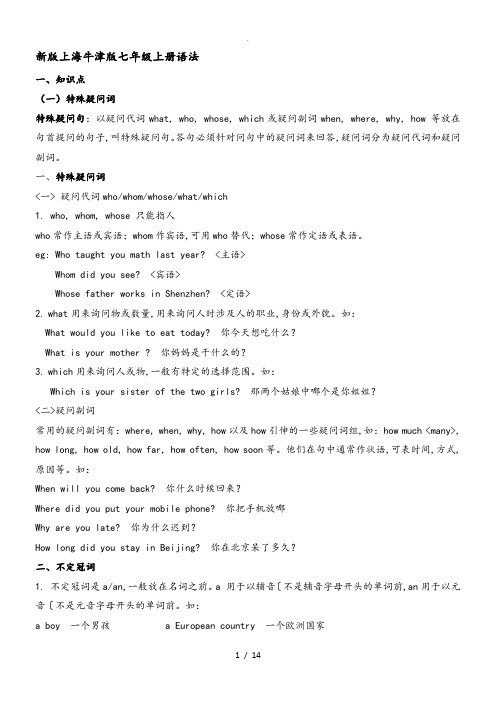
新版上海牛津版七年级上册语法一、知识点(一)特殊疑问词特殊疑问句:以疑问代词what, who, whose, which或疑问副词when, where, why, how 等放在句首提问的句子,叫特殊疑问句。
答句必须针对问句中的疑问词来回答,疑问词分为疑问代词和疑问副词。
一、特殊疑问词<一> 疑问代词who/whom/whose/what/which1. who, whom, whose 只能指人who常作主语或宾语;whom作宾语,可用who替代;whose常作定语或表语。
eg: Who taught you math last year? <主语>Whom did you see? <宾语>Whose father works in Shenzhen? <定语>2.what用来询问物或数量,用来询问人时涉及人的职业,身份或外貌。
如:What would you like to eat today? 你今天想吃什么?What is your mother ? 你妈妈是干什么的?3.which用来询问人或物,一般有特定的选择范围。
如:Which is your sister of the two girls? 那两个姑娘中哪个是你姐姐?<二>疑问副词常用的疑问副词有:where, when, why, how以及how引伸的一些疑问词组,如:how much <many>, how long, how old, how far, how often, how soon等。
他们在句中通常作状语,可表时间,方式,原因等。
如:When will you come back? 你什么时候回来?Where did you put your mobile phone? 你把手机放哪Why are you late? 你为什么迟到?How long did you stay in Beijing? 你在北京呆了多久?二、不定冠词1. 不定冠词是a/an,一般放在名词之前。
新版上海牛津版七年级上册unit6知识点及语法
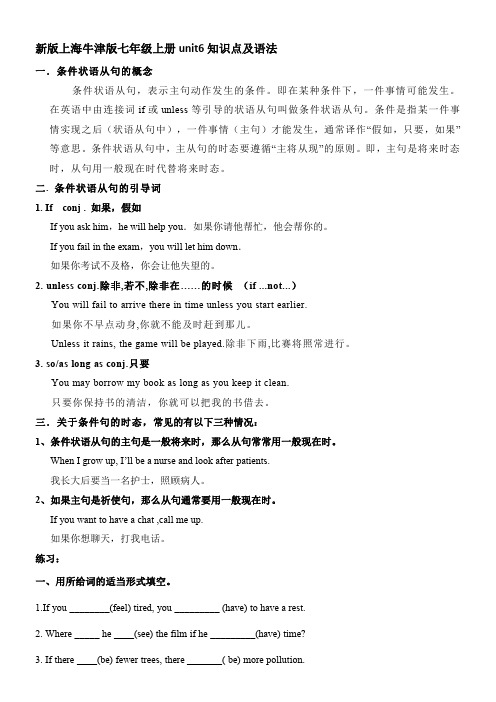
新版上海牛津版七年级上册unit6知识点及语法一.条件状语从句的概念条件状语从句,表示主句动作发生的条件。
即在某种条件下,一件事情可能发生。
在英语中由连接词if或unless等引导的状语从句叫做条件状语从句。
条件是指某一件事情实现之后(状语从句中),一件事情(主句)才能发生,通常译作“假如,只要,如果”等意思。
条件状语从句中,主从句的时态要遵循“主将从现”的原则。
即,主句是将来时态时,从句用一般现在时代替将来时态。
二.条件状语从句的引导词1.If conj.如果,假如If you ask him,he will help you.如果你请他帮忙,他会帮你的。
If you fail in the exam,you will let him down.如果你考试不及格,你会让他失望的。
2.unless conj.除非,若不,除非在……的时候(if...not...)You will fail to arrive there in time unless you start earlier.如果你不早点动身,你就不能及时赶到那儿。
Unless it rains,the game will be played.除非下雨,比赛将照常进行。
3.so/as long as conj.只要You may borrow my book as long as you keep it clean.只要你保持书的清洁,你就可以把我的书借去。
三.关于条件句的时态,常见的有以下三种情况:1、条件状语从句的主句是一般将来时,那么从句常常用一般现在时。
When I grow up,I’ll be a nurse and look after patients.我长大后要当一名护士,照顾病人。
2、如果主句是祈使句,那么从句通常要用一般现在时。
If you want to have a chat,call me up.如果你想聊天,打我电话。
沪教牛津版七上U1-4知识点语法

沪教牛津版七上U1-4知识点语法一、形容词形容词用来描述名词的性质、状态、特征等。
它可以位于名词的前面或后面,用来修饰名词。
例句:1. This is a beautiful flower.(这是一朵美丽的花。
)2. She is a tall girl.(她是一个高个子的女孩。
)形容词的比较级和最高级:形容词的比较级和最高级用来表示两者或多者之间的比较。
形成比较级和最高级的方法:1. 一般情况下在形容词后直接加-er/-est,如bigger/biggest。
2. 以-e结尾的形容词,在后面加-r/-st,如nicer/nicest。
3. 以辅音字母+y结尾的形容词,先变y为i,再加-er/-est,如busier/busiest。
4. 重读闭音节单音节形容词和部分双音节形容词,在词尾加-er/-est,如hotter/hottest。
5. 部分双音节和多音节形容词前加more/most,如beautiful/more beautiful/most beautiful。
例句:1. This book is more interesting than that one.(这本书比那本书更有趣。
)2. They are the tallest buildings in the city.(它们是这个城市最高的建筑物。
)二、名词名词是用来表示人、事物、动物、地点、抽象概念等的词。
例如:1. I have a cat.(我有一只猫。
)2. Tom is a student.(汤姆是一个学生。
)名词的单数和复数形式:大部分名词加-s/-es构成复数形式,但也有一些不规则变化,如man/men,woman/women等。
例句:1. There are many apples in the basket.(篮子里有很多苹果。
)2. I have three dogs and two cats.(我有三只狗和两只猫。
Unit 1 (词汇、课文、语法)2024-2025学年沪教牛津版(2024)七年级英语上册

Unit 1 Friendship一、词汇用所给单词的试单形式填空1.Tom is _________ honest boy. His __________ (honest) makes people like him.2.He is always patient __________ his children.___________ (patient) is very important in our daily life.3.It is important for us ___________ (improve) our English.With her help, my maths has __________ (improve) a lot.4.I have always had the greatest __________ (admire) for him.He really __________ (admire) Peter’s courage.5.I hope our __________ (friend) can last forever.He wants to make __________ (friend) with young people from all over the world. He likes going there because people are __________ (friend) to him.6.We should show respect __________ the old.7.Thank you for your encouragement and __________ (support).He worked hard __________ (support) his family.He __________ (support) me in the past.8.He decided to go with us because he __________ (trust) us.9.We did a lot of __________ (survey) last month.He __________ (survey) the programme and found out the truth.10.We must be careful with our __________ (person) information.He has a good __________ (personal) and everyone likes him.11.She is very __________ (care) and she always __________ (care) for others. We must listen to teachers __________ (care) in class.He is a __________ (care) person. He makes many mistake every day.12.The man __________ (describe) what happened to the policeman.He gave the policeman a __________ (describe) of the man.13.We shouldn’t judge a person by his __________ (appear).He left quickly and __________ (appear).14.We are in the same school, but we are in different __________ (class).15.You need to have a __________ (base) idea about the story.The film is __________ (base) on a real story.16.He had a lot of famous __________ (thought) in his lifetime.He __________ (think) the book may be his and took it home.17.Dinosaurs died out. __________, nobody knows why.18.I am very glad __________ (meet) you here.19.As he watched, one baby spider __________ (rise) into the air.20.The class __________ (end) at 11 a.m. every day.二、课文适当形式填空1.Li Hua is one of my __________ (friend).2.She is a __________ (help) girl and she always __________ (help) others.3.The doctor is __________ (patience) with his patients.4.He always comes to help us solve our __________ (problem).5.We didn’t know what __________ (happen) just now.6.I have to share a room __________ my sister.7.He stood up and __________ (turn) to Tom for help.8.He is one of the tallest __________ (boy) in our class.9.It is __________ (interest) to fly a kite in spring.10.It is fun __________ (play) football in our free time.11.He is good at __________ (sing) and swimming.12.We usually do sports at weekends like swimming, playing basketball and __________ (skip).13.__________ his help, we solved the problem.14.I become __________ (confident) than before. I can speak English __________ (confident).15.Now I have the courage __________ (speak) English in public.16.She is always willing __________ (help) other people.17.My friendship with him __________ (teach) me that friends count __________ each other.18.Friendship is not only about having fun, __________ also about love, honesty and so on.19.It helps them have a better __________ (understand) of China.20.Helping others makes me __________ (feel) better.语篇填空(1)I love my new school! I have made a lot of new 1.__________ (friend) there.Li Hua is one of them. Li Hua is helpful and patient. He is also good at maths. When I meet difficult maths problems, I turn to him 2.__________ help. When something interesting happens to me, I share my 3.__________ (happy) with him. When one of us feels sad, we tell 4.__________ other one and this makes us feel better. We 5.__________ (real) like doing things together. Li Hua loves playing ping-pong with me after school. “It's fun 6.__________ (play) with a good player like you,” he says.With his help, my maths has improved a lot. I am also 7.__________ (confident) than before now, and I have the courage to try new things. My parents also tell me that I am more open and willing to help than before. I think this is all thanks to Li Hua. Close friends can really help us in 8.__________ (we) lives!My friendship with Li Hua 9.__________ (teach) me that friends count on each other for love, admiration, respect and support. Friendships are not only about having fun, 10.__________ also about love, honesty, understanding and trust.语篇填空(2)Ben likes sports very much. There 1.__________ (be) a tennis racket(球拍),two tennis balls and two basketballs in his room. He enjoys 2.__________ (play) sports and he usually plays them on the playground.One afternoon after school, Ben 3.__________ (come)out of his classroom. His father waited 4.__________ him at the school gate.On their way home, Ben saw some 5.__________ (boy) skating in a park. He wanted to skate with them, 6. __________ his father said,“You have no time to skate. You must do your homework. If you finish your homework, I 7.__________ (buy) you an ice cream.”Ben finished 8.__________ (he) homework and got his ice cream. He started to eat it, but a fly(苍蝇)came along. It landed on 9 __________ ice cream. Ben's father told Ben 10.__________ (make) the fly go away. Ben smiled and said, “The fly doesn't have homework. Can't you let him skate for a while?”语法:特殊疑问词根据句意,请从方框中选出合适的特殊疑问词来完成句子。
2024秋沪教牛津新七年级上知识点清单(背诵版)
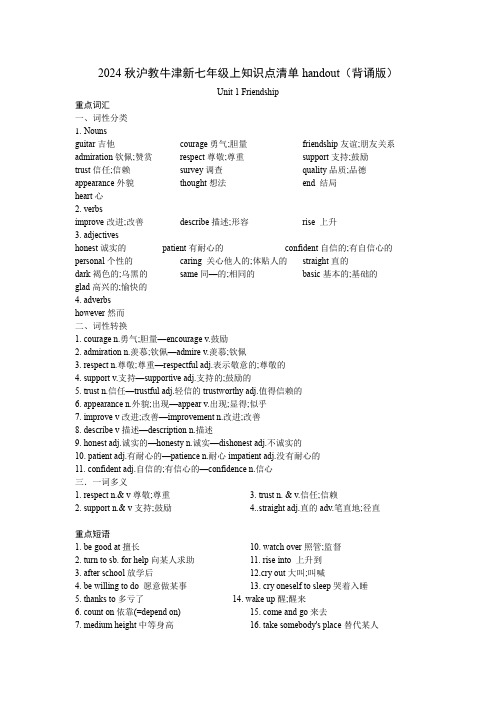
2024秋沪教牛津新七年级上知识点清单handout(背诵版)Unit 1 Friendship重点词汇一、词性分类1.Nounsguitar吉他courage勇气;胆量friendship友谊;朋友关系admiration钦佩;赞赏respect尊敬;尊重support支持;鼓励trust信任;信赖survey调查quality品质;品德appearance外貌thought想法end 结局heart心2. verbsimprove改进;改善describe描述;形容rise 上升3. adjectiveshonest诚实的patient有耐心的confident自信的;有自信心的personal个性的caring 关心他人的;体贴人的straight直的dark褐色的;乌黑的same同—的;相同的basic基本的;基础的glad高兴的;愉快的4. adverbshowever然而二、词性转换1. courage n.勇气;胆量—encourage v.鼓励2. admiration n.羡慕;钦佩—admire v.羡慕;钦佩3. respect n.尊敬;尊重—respectful adj.表示敬意的;尊敬的4. support v.支持—supportive adj.支持的;鼓励的5. trust n.信任—trustful adj.轻信的trustworthy adj.值得信赖的6. appearance n.外貌;出现—appear v.出现;显得;似乎7. improve v改进;改善—improvement n.改进;改善8. describe v描述—description n.描述9. honest adj.诚实的—honesty n.诚实—dishonest adj.不诚实的10. patient adj.有耐心的—patience n.耐心impatient adj.没有耐心的11. confident adj.自信的;有信心的—confidence n.信心三.一词多义1. respect n.& v尊敬;尊重 3. trust n. & v.信任;信赖2. support n.& v支持;鼓励 4..straight adj.直的adv.笔直地;径直重点短语1. be good at擅长10. watch over照管;监督2. turn to sb. for help向某人求助11. rise into 上升到3. after school放学后12.cry out大叫;叫喊4. be willing to do 愿意做某事13. cry oneself to sleep哭着入睡5. thanks to多亏了14. wake up醒;醒来6. count on依靠(=depend on)15. come and go来去7. medium height中等身高16. take somebody's place替代某人8. modern dance现代舞17. come along 出现9. take care of照顾(= look after / care for)核心句式1. What do you like doing?你喜欢做什么?2.Li Hua is helpful and patient.李华乐于助人且有耐心。
Unit3语法课件2024-2025学年沪教牛津版七年级英语上册

1. 找出这里含有形容词的句子
Recently Beijing Universal Studios theme park has opened. The park is the fifth universal cinema in the world and is so beautiful! Today, I got up early to rush to the park. The theme park looks fantastic! When I stepped into the Wizarding World of Harry Potter, I got crazy because Harry Potter is my idol! Then I spent a day in this park. I remained excited when I was leaving. How I wish I could stay here forever even if it seems impossible! But I think I will come back again!
Oct. 1st
1. 形容词副词概念 2. 形容词副词用法
1. The park is beautiful. 是漂亮的 2. The theme park looks fantastic!看起来超棒 3. I got crazy because Harry Potter is my idol! 变得疯狂 4. I remained excited when I was leaving. 保持兴奋 5. How I wish I could stay here forever even if it seems impossible!
2024年沪教牛津版七年级英语上册 Unit8重点短语和知识及语法练习
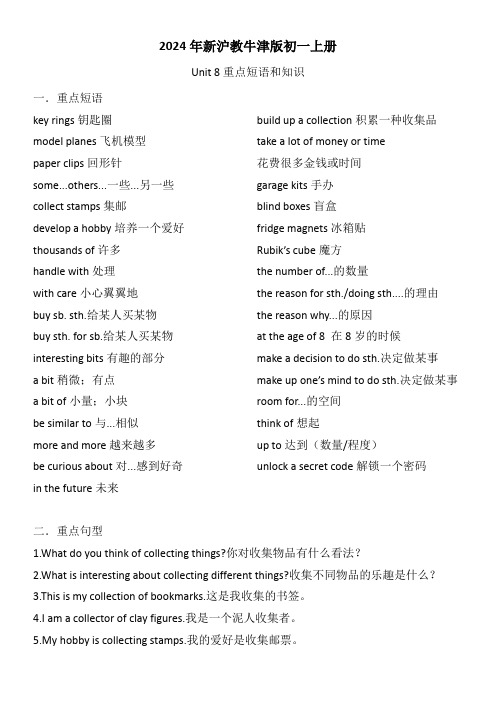
2024年新沪教牛津版初一上册Unit 8重点短语和知识一.重点短语key rings钥匙圈model planes飞机模型paper clips回形针some...others...一些...另一些collect stamps集邮develop a hobby培养一个爱好thousands of许多handle with处理with care小心翼翼地buy sb. sth.给某人买某物buy sth. for sb.给某人买某物interesting bits有趣的部分a bit稍微;有点a bit of小量;小块be similar to与...相似more and more越来越多be curious about对...感到好奇in the future未来build up a collection积累一种收集品take a lot of money or time花费很多金钱或时间garage kits手办blind boxes盲盒fridge magnets冰箱贴Rubik’s cube魔方the number of...的数量the reason for sth./doing sth....的理由the reason why...的原因at the age of 8 在8岁的时候make a decision to do sth.决定做某事make up one’s mind to do sth.决定做某事room for...的空间think of想起up to达到(数量/程度)unlock a secret code解锁一个密码二.重点句型1.What do you think of collecting things?你对收集物品有什么看法?2.What is interesting about collecting different things?收集不同物品的乐趣是什么?3.This is my collection of bookmarks.这是我收集的书签。
2024年沪教牛津版七年级英语上册 Unit1重点短语和知识
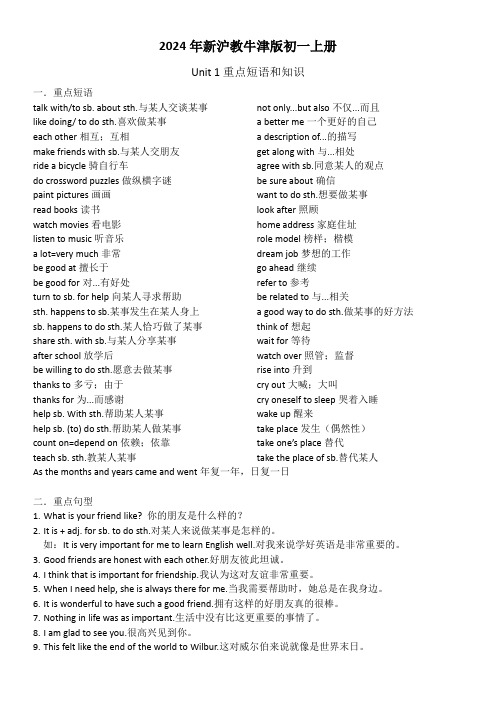
2024年新沪教牛津版初一上册Unit 1重点短语和知识一.重点短语talk with/to sb. about sth.与某人交谈某事like doing/ to do sth.喜欢做某事each other相互;互相make friends with sb.与某人交朋友ride a bicycle骑自行车do crossword puzzles做纵横字谜paint pictures画画read books读书watch movies看电影listen to music听音乐a lot=very much非常be good at擅长于be good for对...有好处turn to sb. for help向某人寻求帮助sth. happens to sb.某事发生在某人身上sb. happens to do sth.某人恰巧做了某事share sth. with sb.与某人分享某事after school放学后be willing to do sth.愿意去做某事thanks to多亏;由于thanks for为...而感谢help sb. With sth.帮助某人某事help sb. (to) do sth.帮助某人做某事count on=depend on依赖;依靠teach sb. sth.教某人某事not only...but also不仅...而且a better me一个更好的自己a description of...的描写get along with与...相处agree with sb.同意某人的观点be sure about确信want to do sth.想要做某事look after照顾home address家庭住址role model榜样;楷模dream job梦想的工作go ahead继续refer to参考be related to与...相关a good way to do sth.做某事的好方法think of想起wait for等待watch over照管;监督rise into升到cry out大喊;大叫cry oneself to sleep哭着入睡wake up醒来take place发生(偶然性)take one’s place替代take the place of sb.替代某人As the months and years came and went年复一年,日复一日二.重点句型1.What is your friend like? 你的朋友是什么样的?2.It is + adj. for sb. to do sth.对某人来说做某事是怎样的。
沪教牛津版七上unit1语法学习

Step 1语法讲解A.疑问词的用法以疑问代词what, who, whom, whose, which或疑问副词when, where, why, how等放在句首提问的句子,叫特殊疑问句。
答句必须针对问句中的疑问词来回答。
疑问代词:what用于对句子的主语、宾语、表语提问。
用于提问“事情、东西”,还可以提问“姓名、职业、时间”等。
What would you like to eat today?What’s your brother? = What did your brother do? = What’s your brother’s job?Who, whom, whose只能指人,who“谁”,常作主语,whom“谁”,常作宾语,whose“谁的”,常作定语或表语。
Who可用来代替whom,但前面有介词时只能用whom(To whom did you give the book?)Who taught you English last year? Whose father works in Beijing?which用来询问人或物,一般有特定的选择范围。
Which is your sister of the two girls?2. when, where, why, how分别对时间、地点、原因和方式。
When did you arrive here? 你什么时候到这里的?Where were you last night? 你昨晚在哪里?Why were you late again? 你怎么又迟到了?How do you go to school? 你怎样上学的?注:when与what time的区别:when指的是大体的时间,而what time询问的是具体的时间。
--What time shall we meet?- At ten o’clock.--When shall we meet?--Tomorrow.3. how many用于询问“多少”,且后面接可数名词复数。
七年级上册英语知识点总结沪教牛津
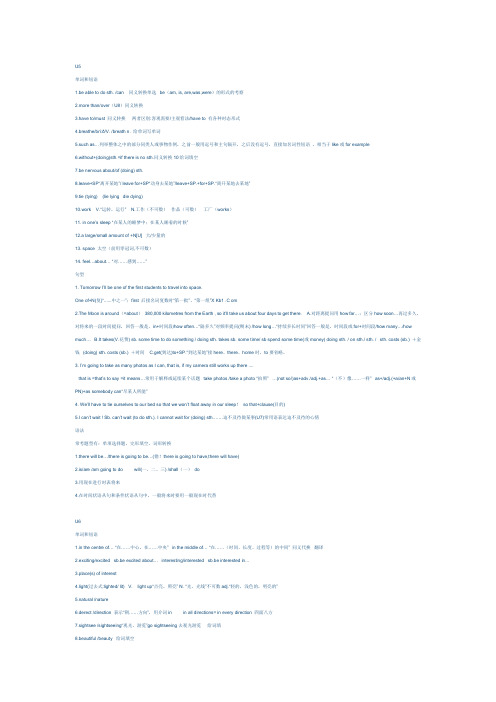
U5单词和短语1.be able to do sth. /can 同义转换单选be(am, is, are,was,were)的形式的考察2.more than/over(U8)同义转换3.have to/must 同义转换两者区别:客观需要/主观看法/have to 有各种时态形式4.breathe/bri:ð/V. /breath n. 给单词写单词5.such as…列举整体之中的部分同类人或事物作例,之前一般用逗号和主句隔开,之后没有逗号,直接加名词性短语,相当于like或for example6.without+(doing)sth.=if there is no sth.同义转换10给词填空7.be nervous about/of (doing) sth.8.leave+SP“离开某地”/ leave for+SP“动身去某地”/leave+SP.+for+SP.“离开某地去某地”9.tie (tying) (lie lying die dying)10.work V.“运转,运行”N.工作(不可数)作品(可数)工厂(works)11. in one’s sleep “在某人的睡梦中;在某人睡着的时候”12.a large/small amount of +N[U] 大/少量的13. space 太空(前用零冠词,不可数)14. feel…about… “对……感到……”句型1. Tomorrow I’ll be o ne of the first students to travel into space.One of+N(复)“......中之一”;first 后接名词复数时“第一批”、“第一组”X Kb1 .C om2.The Moon is around(=about)380,000 kilometres from the Earth , so it’ll take us about four days to get there. A.对距离提问用how far…;区分how soon…再过多久,对将来的一段时间提问,回答一般是,in+时间段/how often…“隔多久”对频率提问(期末) /how long…“持续多长时间”回答一般是,时间段或for+时间段/how many…/how much… B.It takes(V.花费) sb. some time to do something / doing sth. takes sb. some time/ sb spend some time(或money) doing sth. / on sth./ sth. / sth. costs (sb.) +金钱(doing) sth. costs (sb.) +时间 C.get(到达)to+SP.“到达某地”接here、there、home时,to要省略。
沪教牛津版七年级英语上册知识点归纳汇总
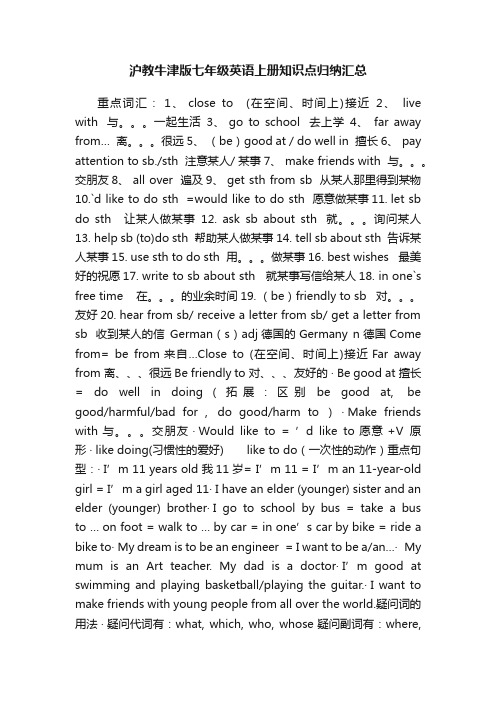
沪教牛津版七年级英语上册知识点归纳汇总重点词汇: 1、 close to (在空间、时间上)接近2、live with 与。
一起生活3、 go to school 去上学4、far away from… 离。
很远5、(be)good at / do well in 擅长6、 pay attention to sb./sth 注意某人/ 某事7、 make friends with 与。
交朋友8、 all over 遍及9、 get sth from sb 从某人那里得到某物10.`d like to do sth =would like to do sth 愿意做某事11. let sb do sth 让某人做某事12. ask sb about sth 就。
询问某人13. help sb (to)do sth 帮助某人做某事14. tell sb about sth 告诉某人某事15. use sth to do sth 用。
做某事16. best wishes 最美好的祝愿17. write to sb about sth 就某事写信给某人18. in one`s free time 在。
的业余时间19. (be)friendly to sb 对。
友好20. hear from sb/ receive a letter from sb/ get a letter from sb 收到某人的信German(s)adj 德国的 Germany n 德国 Come from= be from 来自…Close to (在空间、时间上)接近 Far away from 离、、、很远Be friendly to 对、、、友好的· Be good at 擅长= do well in doing(拓展:区别be good at, be good/harmful/bad for , do good/harm to )· Make friends with 与。
牛津上海版七年级上册Module3语法点综合复习与巩固练习(无答案)
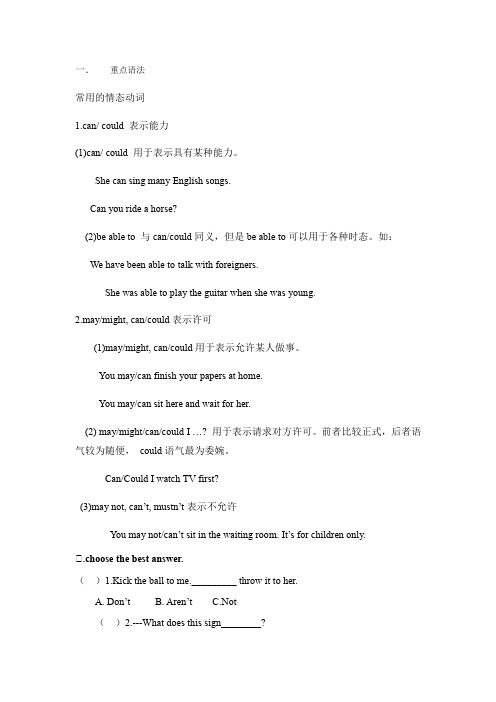
一.重点语法常用的情态动词1.can/ could 表示能力(1)can/ could 用于表示具有某种能力。
She can sing many English songs.Can you ride a horse?(2)be able to 与can/could同义,但是be able to可以用于各种时态。
如:We have been able to talk with foreigners.She was able to play the guitar when she was young.2.may/might, can/could表示许可(1)may/might, can/could用于表示允许某人做事。
You may/can finish your papers at home.You may/can sit here and wait for her.(2) may/might/can/could I …? 用于表示请求对方许可。
前者比较正式,后者语气较为随便,could语气最为委婉。
Can/Could I watch TV first?(3)may not, can’t, mustn’t表示不允许You may not/can’t sit in the waiting room. It’s for children only.Ⅰ.choose the best answer.()1.Kick the ball to me._________ throw it to her.A. Don’tB. Aren’tC.Not()2.---What does this sign________?---It________ you shouldn’t walk on the grass in the park.A.mean;meanB. means;meansC.mean; means()3.The signs________ the lake say ‘No cycling’. We can’t cycle here.A. aroundB. roundC.a round()4. Mum’s coat is black. ________ is white.A. HeB. MineC. Your()5.________ you see the sign over there?A. canB. can’tC. Can’t()6.---Can I ask you a question?----No, you can’t. You________ ask the teacher.A. willB. shouldC. would()7. Which is the first day of the week?_________________.A. MondayB. SundayC. Saturday()8. The boys _________ books in the classroom now.A. are looking atB. are readingC. are seeing()9. The park keeper ________ a sign on the grass.A. pointsB. point toC. points to()10. There’s _________ English book over there. ________ English book is Sarah’s.A. the; AnB. an; AnC. an; The()11----Would you like some_____________?----Just a little.A.apple juicesB.carrotsC. orangeD.pears()12.--__________________________?--Yes,I’d like some green tea.A.What would you like?B.What can I do for you?C.Can I help you?D.A.B.C.()13.Some ___________noodles are nice.A.tomato and eggsB.tomatoes and eggsC.tomato and eggD.tomatos and eggs()14.---Would you like go swimming with us?---______________________.A.No, I wouldn’tB.Yes,I wouldC.Yes, I’d loveD.Yes, I’d love to()15.---Would you like some orange?---______________________.A.Yes, it is.B.Yes, pleaseC.No,I wouldn’tD.Yes, I would()16.---_____________rice would you like?---Medium, please.A.How manyB.What size bowl ofC.What sizeD.What kind()17.---_________________?---Yes,I’d like some bread.A.What are you doing?B.What do you want?C.Can I help you?D.Do you love bread?()18._________like some ice cream and salad.A.He wouldsB.he doesC.He’dD.He wouldn’t()19.We all know beef is ____________meat.A.a kindB.kind ofC.a kind ofD.kind()20.Old Mike has lots of_____________on his farm.Heeats___________every day.A.chicken;chickenB.chickens;chickenC.chicken;chickensD.chickens;chickens( )21.-I am Jim Green. -is my family name.A..JimB.Jim GreenC.GreenD.Green Jim( )22.-What’s your favorite______?BasketballA.sportB.colorC.subjectD.movie( )23.-May I help you?-.A.No,you can’t.B.Yes,please.C.Yes,you can.D.Sorry.( )24.____the man? He is Kate’s father.-.A.What’s.B.Who’sC.Whose’sD.How’s( )25.She can English.A. speakingB.speakC.speaksD.to speak( )26.-Thank you very much.-.A.Thank you very muchB. All rightC.You’re welcomeD.You don’t thank me.( )27.-What color is it?-It’s orange.It’s orange pen.A.a,anB.an,anC.an,-D.-,an( )28.Mrs. Green is Jim’s mother.Jim is her .A.brotherB.sisterC.sonD.daughter( )29.-What you doing?-I’m a book.A.do,seeingB.are,lookingC.do,watchingD.are,reading ( )30.December is _____month of a year.A.twelveB.the twelvethC.the twelfthD.first.( )31.A:My name is Marry. B: I am Jenny.___A.What’s your name?B.Who are you?C.Hello!D.Nice to meet you! ( )32.Does he have a volleyball?Yes, he____.A.doB.haveC.isD.does( )33.Do you like ____?A.bananasB.appleC.strawberrysD.coffees( )34.This story sounds_____.Which is wrong(错误的).A.interestingB.dearC.boringD.scary( )35.___? My birthday is June 1st.A.Where were you born?B.Where are you?C.When is your birthday?D.When is her birthday( )36. Tom ______ carefully but could ____ nothing.A. listened, hearB. heard, listen toC. listened to, listenD. heard, hear fromII. Fill in the blanks with the proper forms of the given words:1. They can see many _____________ (difference) signs in the park.2. Our teacher ______________ (warning) us not to play ball games in the corridoryesterday.3. Can you tell me the ____________ (mean) of this sign?4. Many American young people go ___________ (hike) on their holidays.5. We can store a lot of ______________ (inform) in our computer.6. At the _____________ (begin) of the lesson, the teacher told us a story.7. Though the old man was __________ (die), the doctor was trying his best to savehim.8. I saw a big dog ____________ (lie) in front of his house.9. Last night we __________ back home until the teacher left school. (not go)10. Comrade Li Dazhao __________ in prison in 1927. (put)11. Where is professor Lee?He __________ to the library. He'll come back soon. (go)12. We could not help __________ after we heard the story. (laugh)13 Would you please __________ me an English-Chinese dictionary when you come? (bring)14.He told me that he __________ the Great Wall the year before. (visit)15. I'll tell him the news as soon as he __________ back. (come)16. I twenty pounds for the drawing.(花)III. Rewrite the sentences as required:1. It is a direction sign. (划线提问)__________________________________________?2. This sign means: we must not leave rubbish. (划线提问)。
牛津上海版英语七年级上册知识点

牛津上海版英语七年级上册知识点概述---在牛津上海版英语七年级上册中,我们学习了许多有趣且实用的知识点,这些知识点涉及了英语语法、词汇、阅读和写作等方面。
通过对这些知识点的学习,我们可以更好地掌握英语,提高我们的语言能力和沟通能力。
下面,我将从不同的角度来深入探讨这些知识点,希望能够帮助你更好地理解和掌握这些知识。
一、语法知识点在牛津上海版英语七年级上册中,我们学习了许多基础和重要的语法知识点,比如动词的时态、名词的单复数、形容词和副词的比较级和最高级等。
这些知识点对于我们正确理解和使用英语至关重要。
1. 动词的时态动词的时态是英语语法中一个非常基础也非常重要的知识点。
在学习动词的时态时,我们不仅需要了解各种时态的构成和用法,还需要多做练习,才能够熟练掌握。
2. 名词的单复数名词的单复数形式是我们学习英语时需要重点掌握的内容之一。
在中文和英文中,名词的单复数形式有很多规律和不规则变化,我们需要通过大量的练习来熟练掌握这些规则和不规则变化的情况。
3. 形容词和副词的比较级和最高级形容词和副词的比较级和最高级是我们在表达事物的特征和程度时经常会用到的语法知识点。
通过学习这些知识点,我们可以更准确地描述事物的特征和程度。
二、词汇知识点在牛津上海版英语七年级上册中,我们学习了许多常用且实用的词汇知识点,这些词汇囊括了各个方面的日常生活和学习,能够帮助我们更好地理解和运用英语。
1. 日常生活词汇在学习英语的过程中,我们需要掌握一些日常生活中常用的词汇,比如家庭、食物、交通工具、颜色、数字等。
通过学习这些词汇,我们可以更好地与他人交流,也更便利地适应各种日常场景。
2. 学习用语在学习英语的过程中,我们还需要掌握一些学习用语,比如学校、课程、学科、考试、活动等。
这些词汇在我们参与学校教育和学习活动时非常有用,能够帮助我们更好地理解和参与课堂学习和校园生活。
三、阅读和写作知识点在牛津上海版英语七年级上册中,我们还学习了一些阅读和写作的知识点,这些知识点能够帮助我们提高阅读理解能力和写作表达能力,从而更好地应对各种英语应用场景。
Unit8语法课件沪教牛津版(2024)七年级英语上册

A. me
B. mine
C. my
=my friends
=Her coat
Exercise time
1. He isn't in my room. He maybe in________=__h.is
A. him
B. he
C. his
room
2. Can you show_______ around_________ school?
Exercise time
1. This book is for _____hm_i_______(他).
介词+宾格
主语 2. ______S_h__e____(她) is sitting behind _____t_h_e__(他们).
m
主语 3. ______I____ am writing letters to _____h_e__r__(她).
3. — Is that ______ dog?
— No. ______ is white.
A. his; His
B. her; His
D. My
C. her; him
D. yours; her
C. he; His
D. her; Her
总结
notes 看物主代词后 是否接名词 接名词,用 形物代 。 不接名词,用 名物代 。
your family?
about
物主代词的书写
物主代词
中文
note物s 主代词
形容词性
名词性
物主代词 物主代词
第一人称单数
我的
my
mine
第二人称单数 第三人称单数 第一人称复数 第二人称复数
- 1、下载文档前请自行甄别文档内容的完整性,平台不提供额外的编辑、内容补充、找答案等附加服务。
- 2、"仅部分预览"的文档,不可在线预览部分如存在完整性等问题,可反馈申请退款(可完整预览的文档不适用该条件!)。
- 3、如文档侵犯您的权益,请联系客服反馈,我们会尽快为您处理(人工客服工作时间:9:00-18:30)。
新版上海牛津版七年级上册语法一、知识点(一)特殊疑问词特殊疑问句:以疑问代词what, who, whose, which或疑问副词when, where, why, how 等放在句首提问的句子,叫特殊疑问句。
答句必须针对问句中的疑问词来回答,疑问词分为疑问代词和疑问副词。
一、特殊疑问词(一) 疑问代词who/whom/whose/what/which1. who, whom, whose 只能指人who常作主语或宾语;whom作宾语,可用who替代;whose常作定语或表语。
eg: Who taught you math last year? (主语)Whom did you see? (宾语)Whose father works in Shenzhen? (定语)2.what用来询问物或数量,用来询问人时涉及人的职业,身份或外貌。
如:What would you like to eat today? 你今天想吃什么?What is your mother ? 你妈妈是干什么的?3.which用来询问人或物,一般有特定的选择范围。
如:Which is your sister of the two girls? 那两个姑娘中哪个是你姐姐?(二)疑问副词常用的疑问副词有:where, when, why, how以及how引伸的一些疑问词组,如:how much (many), how long, how old, how far, how often, how soon等。
他们在句中通常作状语,可表时间,方式,原因等。
如:When will you come back? 你什么时候回来?Where did you put your mobile phone? 你把手机放哪Why are you late? 你为什么迟到?How long did you stay in Beijing? 你在北京呆了多久?二、不定冠词1. 不定冠词是a/an,一般放在名词之前。
a 用于以辅音(不是辅音字母)开头的单词前,an用于以元音(不是元音字母)开头的单词前。
如:a boy 一个男孩 a European country 一个欧洲国家an island 一座岛屿an hour 一小时2.不定冠词的用法(1) 用在可数名词的单数形式前面*表示一类事物或人中的任何一个。
如:There is an island over there. 那儿有一座岛Be sure to bring me a dictionary. 一定要给我带本字典来。
*表示一类事物或人,a/an 在此处不用翻译。
如:An ear is an organ for listening. 耳朵是听觉器官。
A tiger is a wild animal. 老虎是一种野生动物。
(2) 用在专有名词前面,表示“一个”、“一种”、“一类”或“一个类似.....的”。
如:That city is a Venice in China. 那座城市是中国的威尼斯。
1.容易弄错的单词总结an hour一个小时an honest boy一个诚实的男孩a university一座大学a uniform一件制服an unusual watch一块不寻常的手表a useful book一本有用的书a umbrella一把雨伞an uncle一位叔叔(二)一般现在时:表示现在的状态、经常的或习惯性的动作、表示主语具备的性格和能力等。
与一般现在时连用的时间状语:often,always,sometimes,usually,every day/ week/ year 等。
一般现在时的构成:(be动词型)肯定句:主语+am/is/are+其它成分(名词、形容词、介词短语)He is an engineer.否定句:主语+am/is/are not+其它成分They are not in the library.一般疑问句:Am/ Is /Are+主语+其它成分?Is it a tall tree? Yes, it is. / No, it isn’t.一般现在时的构成:(实义动词型)肯定句:主语(除第三人称单数)+动词原形+其它成分I get up at six every day .主语(第三人称单数)+动词s/es +其它成分My father usually goes to work by bus.否定句:主语(除第三人称单数) +don’t+动词原形+其它成分I don’t like swimming.主语(第三人称单数)+doesn’t+动词原形+其它成分The old man doesn’t like playing cards .一般疑问句:Do +主语(除第三人称单数) +动词原形+其它成分?Do the boys often go swimming in summer?Yes, they do. / No, they don’t.主语为第三人称单数Does+主语+动词原形+其它成分?Does she brush her teeth every day?Yes, she does. / No, she doesn’t.主语是第三人称单数时,行为动词的变化规则如下:1、一般动词在词尾加-s,如: helps,makes,gets,swims,knows,plays等2、以s,x,ch,sh 或o结尾的动词在词尾加-es,如dresses,washes,catches,does等3、以辅音字母+y结尾的动词,先变y为i,再加-es,如fly---flies,study--- studies等play-plays enjoy-enjoys(四)名词:名词是表示人,事物,地点或抽象概念的名称。
名词分为可数名词和不可数名词。
可数名词表示可以用数字进行计算的名词,不可数名词表示不能用数字进行计算的。
可数名词有单复数形式,若要表示一本书、一只鸟、一棵树等概念,需使用名词的单数形式。
表示名词的单数时,要在名词前面加上冠词a或an.若要表示两个或两个以上的概念时,要用到名词的复数形式。
My younger sister has a job in a store.我妹妹在商店工作。
She has two jobs.她打两份工。
(一)、可数名词与不可数名词注:集体名词做主语时,谓语动词可以用单数,也可以用复数,如果强调整体用单数,强调个体或成员,则用复数.The police are searching for him.The Chinese people are brave and hardworking.(二)、名词复数形式变化:(1)规则变化1)一般变化,在名词后加-s,如:book—books; bag—bags2) 以s, x, ch, sh结尾的名面,加-es,如:bus—buses; box—boxes; watch—watches; wish—wishes; glass—glasses3) 以辅音字母加-y结尾的单词,变y为i再加-es,如:city—cities; country—countries; study—studies; family—families4) 以f或fe结尾的单词,有些将f或fe变为v, 再加-es; 有些只加-s :wife—wives; knife—knives; wolf—wolves; thief—thieves; shelf—shelves; myself—myselves;life—lives; half—halves; leaf—leaves;roof—roofs; chief—chiefs; belief—beliefs; proof—proofs;handkerchief—handkerchiefs/handerchieves(手帕/头巾)5) 以o结尾的名词,有些加-s ,有些加-es。
如:hero—heroes; Negro—Negroes; potato—potatoes; tomato—tomatoes (两人两菜)photo—photos; radio—radios; piano—pianos; studio—studios;bamboo—bamboos; zero—zeros/zeroes;(2)不规则变化child—children; foot—feet; tooth—teeth; goose—geese;mouse—mice; man—men; woman—women注意:由一个词加man或woman构成的合成词,其复数形式同上。
Englishman—Englishmen; Frenchman—frenchmen; 但German—Germans(不是合成词)(3)单复数同形deer; sheep; fish; Chinese; Japanese(4)有些名词只用复数形式:clothes(衣服); pants(短裤;裤子); jeans(牛仔裤); shorts(短裤); glasses(眼镜); scissors(剪刀)这类词常与a pair of ; two pairs of 这样的短语连用(5)某些词虽以s结尾,但仍为单数;a. maths, politics, physics等学科名词,一般是不可数名词,为单数;b.news为不可数名词;c. the United States(the US); the United Nations(the UN)应视为单数;(三)、不可数名词只有单数形式。
物质名词通常属于不可数名词。
如:液体和气体:water; milk; air; 思想和感觉:beauty; love; hate极小的物体:rice; salt; sand 学校科目:English; Maths; Art四、一般现在时中,单数可数名词和不可数名词后要用动词的第三人称单数形式;可数名词复数后要用动词原形。
如:This orange comes from Germany.This coffee comes from Germany.These oranges come from Germany.五、不可数名词的量词物质名词的数量,一般用单位或容器的量表示,即“单位+of+物质名词”的形式。
I had a bowl of soup and two cups of tea just now.我刚刚喝了一碗汤和两杯茶。
如 a piece of; a bottle of ; a glass of ; two cups ofThere be 句型:There be 句型与have(has; had)的各种形式的区别1、there be 句型表示:在某地有某物(或人)There is a vase on the table.2、在there be 句型中,主语是单数,be 动词用is ; 主语是复数,be 动词用are ; 如有几件物品,be 动词根据最邻近be 动词的那个名词决定,即“就近一致”。
